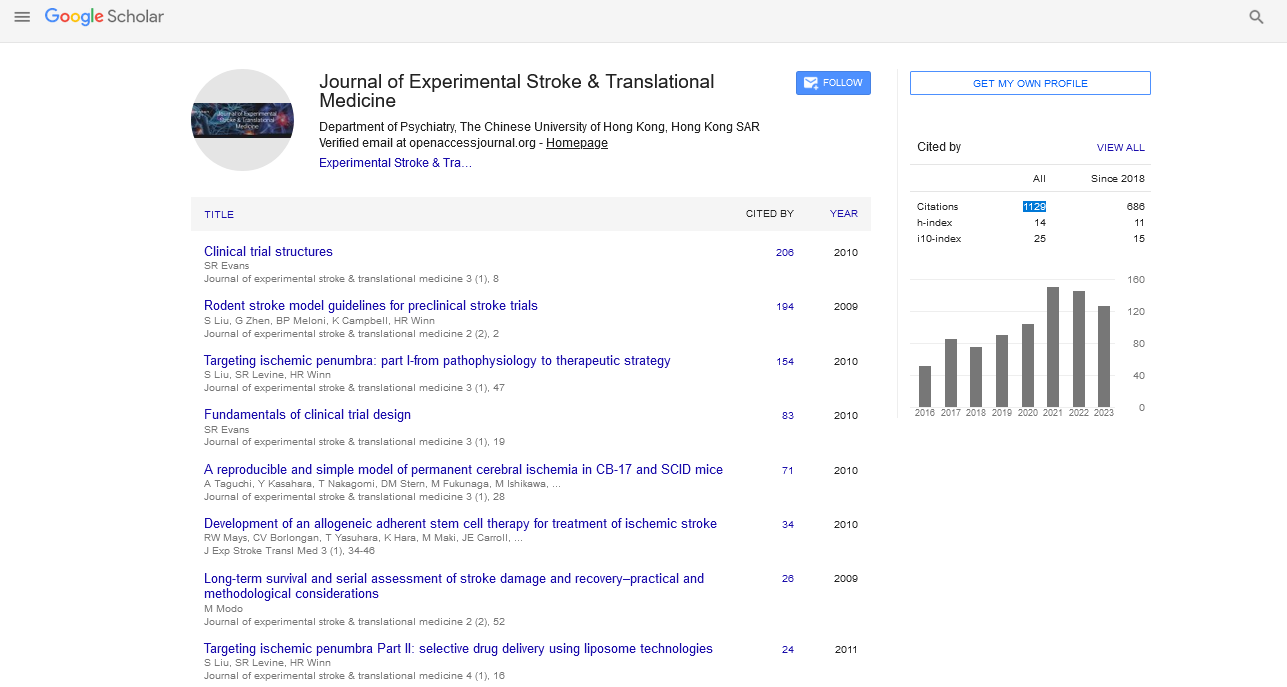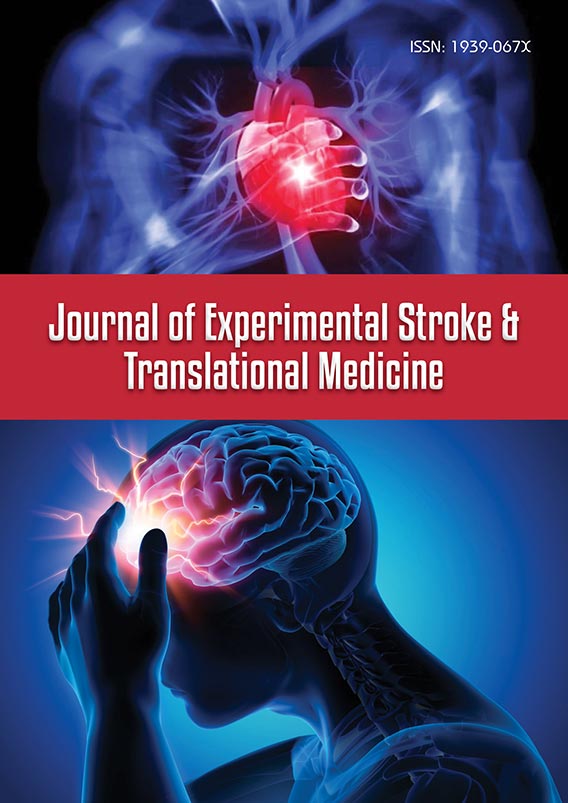Perspective - Journal of Experimental Stroke & Translational Medicine (2024) Volume 16, Issue 4
Understanding Post-Stroke Stomach: Challenges and Management Strategies
- Corresponding Author:
- David Cavazos
Department of Cardiology,
Academi University,
Mikkeli,
Finland
E-mail: dcavaz@tarleton.edu
Received: 04-Jul-2024, Manuscript No. jestm-24-140736; Editor assigned: 09-Jul-2024, PreQC No. jestm-24-140736 (PQ); Reviewed: 23-Jul-2024, QC No. jestm-24-140736; Revised: 01-Aug-2024, Manuscript No. jestm-24-140736 (R); Published: 29-Aug-2024, DOI: 10.37532/jestm.2024.16(4).225-226
Introduction
Stroke, a leading cause of disability globally, not only impacts neurological functions but also affects various bodily systems, including the gastrointestinal tract. Post-stroke complications are diverse and often include motor deficits, cognitive impairments and sensory disturbances. However, lesser-known yet significant is the impact of stroke on the stomach and its associated complications. This article delves into the complexities of post-stroke stomach issues, exploring the challenges patients face and strategies for effective management.
Description
The impact of stroke on the gastrointestinal system
Stroke, characterized by a sudden interruption of blood supply to the brain, can result in varying degrees of damage depending on the affected area. Most commonly associated with motor and sensory deficits, strokes can also disrupt the autonomic nervous system, which regulates involuntary bodily functions, including digestion. This disruption often leads to gastrointestinal complications, commonly referred to as post-stroke stomach.
Mechanisms behind post-stroke stomach syndrome
The exact mechanisms causing gastroparesis post-stroke are not fully understood but are thought to involve both neurological and muscular factors. Stroke-induced damage to the brain can disrupt the autonomic nervous system, which controls involuntary functions such as digestion. Additionally, impaired muscle coordination in the stomach and intestines may contribute to slowed gastric emptying.
The impact of stroke on digestive health
A stroke occurs when blood flow to the brain is interrupted, leading to oxygen deprivation and cell damage. This neurological event can manifest in various ways, affecting motor skills, speech, cognition and more. Less commonly recognized is its potential impact on the gastrointestinal tract, which plays a crucial role in digestion, nutrient absorption and overall health.
Post-stroke stomach syndrome, also referred to as gastroparesis, is a condition where the stomach’s ability to empty its contents is impaired. This delay in gastric emptying can result in symptoms such as.
Nausea and vomiting: Patients may experience frequent bouts of nausea, sometimes leading to vomiting, especially after meals.
Early satiety: A feeling of fullness may occur shortly after starting a meal, limiting food intake.
Bloating and abdominal discomfort: Due to slow digestion, gases can accumulate in the stomach, causing discomfort and bloating.
Unintended weight loss or gain: Changes in eating habits and digestion can lead to fluctuations in weight.
Diagnostic challenges and approaches
Diagnosing post-stroke stomach issues can be challenging due to overlapping symptoms with other stroke-related complications. Healthcare providers typically employ a combination of clinical assessments and diagnostic tests, including.
Clinical assessment: Evaluating symptoms such as swallowing difficulties, reflux symptoms and changes in bowel habits.
Imaging studies: X-rays, barium swallow tests and endoscopies help visualize structural abnormalities and assess swallowing function.
Functional tests: Gastric emptying studies and esophageal motility tests provide insights into the digestive process.
Management strategies
Management of post-stroke stomach issues focuses on alleviating symptoms, preventing complications and improving quality of life. Key strategies include.
Dietary modifications: Adjusting diet texture (e.g., soft or pureed foods for dysphagia) and consistency (e.g., small, frequent meals for gastroparesis) can improve swallowing and digestion.
Medications: Proton Pump Inhibitors (PPIs) and prokinetic agents help manage GERD and gastroparesis symptoms by reducing acid production and improving gastric motility.
Swallowing therapy: Speech-language pathologists offer exercises and techniques to strengthen swallowing muscles and reduce the risk of aspiration.
Bowel management: Increasing fiber intake, staying hydrated and using stool softeners or laxatives can alleviate constipation.
Long-term outlook and quality of life
The prognosis for post-stroke stomach issues varies depending on the severity of neurological damage and the effectiveness of management strategies. Early intervention and multidisciplinary care involving neurologists, gastroenterologists, dietitians and therapists play crucial roles in improving outcomes and enhancing quality of life for stroke survivors.
Challenges in treatment
Treating post-stroke stomach syndrome can be complex due to its variable presentation and the underlying neurological damage from the stroke itself. Patients may respond differently to treatments and finding the right balance of interventions tailored to individual needs is crucial.
Research and future directions
While advancements in stroke care have improved outcomes for many patients, further research into the gastrointestinal consequences of stroke is needed. Understanding the specific pathways involved in post-stroke stomach syndrome could lead to targeted therapies and improved quality of life for stroke survivors.
Conclusion
In conclusion, while stroke primarily affects neurological functions, its impact on the gastrointestinal system, often overlooked, poses significant challenges for patients and healthcare providers alike. Recognizing and addressing post-stroke stomach issues early can lead to better outcomes and improved quality of life. Through a comprehensive approach integrating medical interventions, dietary adjustments and therapeutic strategies, healthcare teams can effectively manage these complications, offering hope and support to stroke survivors on their journey to recovery.

